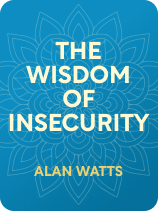

This article is an excerpt from the Shortform book guide to "The Wisdom of Insecurity" by Alan Watts. Shortform has the world's best summaries and analyses of books you should be reading.
Like this article? Sign up for a free trial here.
Is there animalistic behavior in humans? How do you embrace your inner animal so you can live in the moment?
In The Wisdom of Insecurity, Alan Watts argues that according to Eastern religions, you have to give up your thinking self’s attachment to security and embrace your animal self’s capacity for living in the moment. He further discusses his advice for doing so and explores the benefits.
Check out how to find your inner animal and stay in the present.
How to Go With the Flow
Watts explains that the thinking self and the animal self each have their uses—for example, the thinking self enables you to communicate with others, while an example of animalistic behavior in humans is to alert them to internal cues like pleasure and pain. However, he says that presently, society is tilted heavily in favor of the thinking self—evidenced by our overreliance on human concepts like religion, for example, to guide our decision-making (as opposed to also listening to bodily cues like the sensations that accompany feelings of guilt or comfort). Since you aren’t living in tune with your animal self, you’re anxious—you need time to just experience life, rather than always thinking and talking about life.
(Shortform note: Psychologists agree that in modern society, many factors contribute to identification with the mind over the body—these include a historical tendency to believe the mind is more important than the body, distractions like technology, and traumas that impair your ability to listen to your body. To help you overcome these issues, somatic therapists can teach you embodiment practices like dance, yoga, and singing—techniques that help you sense, fully feel, and move through physical sensations that are tied to your emotions. Mindfulness (the Buddhist practice of living in the present) may be another solution, since it enables you to savor your bodily experiences and therefore contributes to greater peace of mind.)
Watts says that the solution to this problem is to integrate your thinking and animal selves. This means living in the moment according to your body’s wisdom like an animal would do—eating, sleeping, and doing other activities when your body tells you it’s time to do so, rather than relying on an imposed schedule or dogma to guide your choices. As you do so, your thinking self should be focused on the present, not the past or the future. Watts explains that this is the true purpose of your thinking self—to help you more fully comprehend, or at least appreciate, the present moment. He also says that nobody can teach you how to do this—you’re already doing it, even if you don’t believe you are, so all you have to do is continue and not let your thinking self get in the way.
(Shortform note: If you’re struggling to integrate your thinking and animal selves, psychologists offer some tips to help you listen to your body: First, make a regular, conscious effort to check in with yourself and determine how you’re feeling. Then choose to trust those feelings. One way to practice this is with intuitive eating—a method of listening to your body’s hunger cues and responding accordingly—which experts Evelyn Tribole and Elyse Resch explain in detail in their book, Intuitive Eating. Other experts note that you can enhance your bodily awareness through mindfulness and meditation practices.)
How Embracing Your Animal Self Makes You Happier
Integrating your animal and thinking selves transforms pain. Watts says when your thinking self is in charge, you try to escape pain by distracting yourself from the experience with thoughts of the past or future. But this is futile because you can’t escape the present—recall that you are your present experience. Distracting yourself from the present only disrupts your ability to understand and accept it, which is necessary if you’re going to move through it. Therefore, distracting yourself from pain only prolongs pain. When you embrace your animal self, you deal with pain like animals do: You’re able to endure the pain as it’s happening, and when it’s over, you move on. Your thinking self focuses on your present experience instead of avoiding it.
(Shortform note: While Watts advocates embracing your pain, other experts are divided as to whether this is an effective pain management approach. Some studies suggest that mindfulness meditation (which focuses your attention on your present experience) can make pain easier to endure by helping you separate the physical sensation of pain from the negative judgments you attach to that sensation; similarly, some studies suggest engaging with emotional pain helps you accept and move on from it. However, other studies suggest that distracting yourself is better for reducing physical pain and, in some cases, emotional pain. The idea is that since your attention is limited, focusing on something else stops you from perceiving or being consumed by pain.)
Embracing your animal self also helps you more fully enjoy pleasure and avoid causing yourself unnecessary pain. This is because, as discussed, focusing your awareness on the present (instead of the past or future) allows you to get the most out of each moment—for example, you’re going to enjoy the act of gardening more if you’re focused on the sensation of working with plants and dirt than if you’re focused on whether your flowers will bloom in the future.
(Shortform note: In his book Flow, psychologist Mihaly Csikszentmihalyi argues that getting full enjoyment out of an experience requires more than merely living in the moment (or, in Watts’s terminology, embracing your animal self). Often, other criteria must be satisfied, which include pursuing a clear goal, feeling capable of achieving that goal, and receiving immediate feedback that suggests you’re making progress. With regard to the gardening example above, your clear goal could be removing weeds, your capability may be tied to the tools and know-how you have on hand, and immediate feedback could involve seeing the weeds disappear from your garden as you work.)
Watts says that embracing your animal self also prevents you from getting trapped in the painful, anxiety-producing cycle of consumerism.
(Shortform note: Other experts agree that living in the moment helps you escape the cycle of consumerism—they say that by increasing your awareness of the relationship between your thoughts and behaviors, mindfulness can interrupt the impulse to consume, giving you the opportunity to make a different choice.)
According to Watts, integrating your thinking and animal selves also gives you a deep, bodily understanding—rather than an abstract idea—that everything that exists is part of an integrated whole. This will enable you to experience true freedom. (Shortform note: It’s not clear what Watts means by “bodily understanding,” but some experts say that understanding always begins with the body, not the mind, since to know anything requires perception of physical stimuli.)
Watts argues that when you understand yourself as an individual thinking self, you tend to conceive of freedom as your ability to influence the world. But when you see yourself as part of the whole, you understand freedom as the ability to be part of existence—you can do anything that’s possible because you’re already part of the world of possibilities, and you’ll listen to your bodily cues instead of being restricted by human abstractions like schedules and religion.
Watts says once you have a bodily understanding of essential unity, you’ll stop making decisions based on the unnatural pursuit of pleasure or the avoidance of pain—you’ll simply be going with the flow from moment to moment. In his view, most immoral actions are the result of pursuing pleasure and avoiding pain—prioritizing the thinking self’s desire for permanence over your true momentary needs. Moral actions, on the other hand, are the result of being united with all of existence—which Watts argues is the equivalent of love, since love brings things together. He explains that the combination of living in the present and acting in a loving way is key to a more peaceful, united world.
| The Link Between Mindfulness, Freedom, and Morality Watts argues that true freedom is the ability to live in the moment according to your body’s wisdom. In A New Earth, Eckhart Tolle argues similarly that every part of existence is constituted of and guided by an inherent wisdom called pure conscious energy—a force that structures the universe and enables all kinds of life, including humans, to go on living. According to Tolle, pure conscious energy drives plants to photosynthesize and animals to survive—they’re free to simply exist. Humans have a similar freedom, but they’re uniquely aware of their own consciousness—like Watts, Tolle argues that uniting with that inner wisdom is necessary to achieve true freedom. Tolle explains that uniting with your innate consciousness helps you experience freedom because it enables you to let go of attachments, stop making judgments, and accept reality instead of resisting it. When the majority of humans unite with consciousness, he says we’ll be liberated from our egos’ desire to engage in destruction. So for Tolle, like Watts, true freedom amounts to something like love—the ability to cooperate with the universe in life-affirming ways. But how exactly does an embodied appreciation of essential unity lead to greater morality? One plausible explanation is that mindfulness enhances authenticity. Studies suggest that practicing mindfulness helps you make choices that are aligned with your values—it follows that if you value the essential unity of all of life more than your own pleasure or pain, you’ll be more inclined to behave in ways that promote togetherness as opposed to discord when you practice living in the moment (mindfulness). Whether you believe that prioritizing togetherness makes you more moral depends on your values, but some research suggests that universal well-being is one of the most basic and widely shared human values. However, it’s likely difficult in practice to unite yourself with all of existence all the time. For example, in All About Love, feminist theorist bell hooks explains that behaving lovingly begins with self-love—and practicing self-love may sometimes require you to assert yourself against somebody else. When such situations arise, experts say that you can resolve conflicts ethically by being respectful of differences (as opposed to encroaching on others’ freedom), refusing to tolerate violence, and compromising when possible. |

———End of Preview———
Like what you just read? Read the rest of the world's best book summary and analysis of Alan Watts's "The Wisdom of Insecurity" at Shortform.
Here's what you'll find in our full The Wisdom of Insecurity summary:
- Philosopher Alan Watts's treatise on the origins and solutions to anxieties
- Why seeking security makes us anxious and how to accept insecurity
- How Eastern religions can help anxiety and Western ones make it worse






